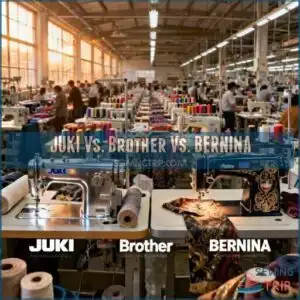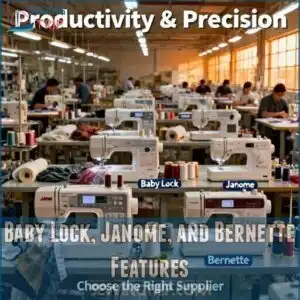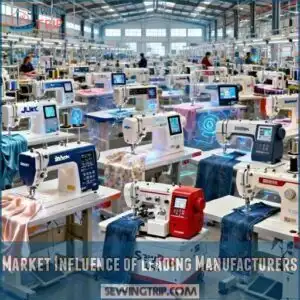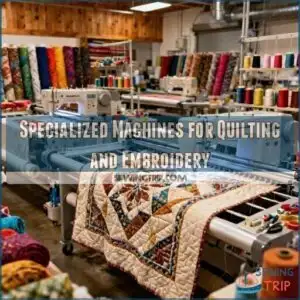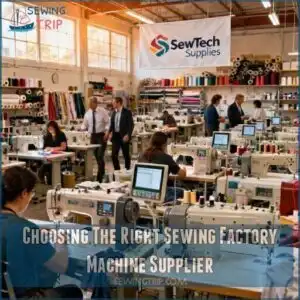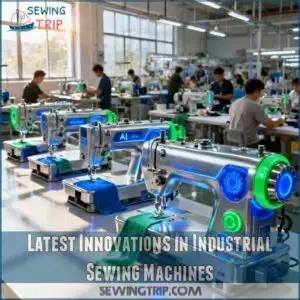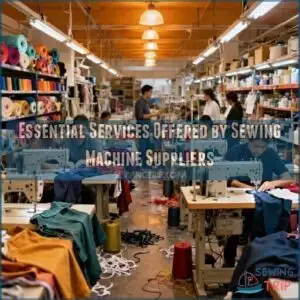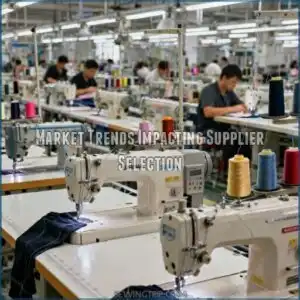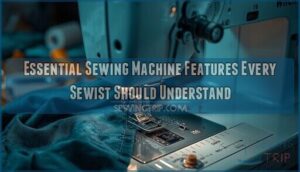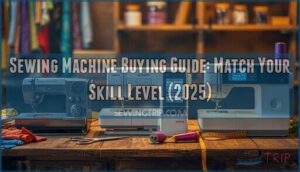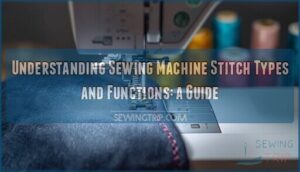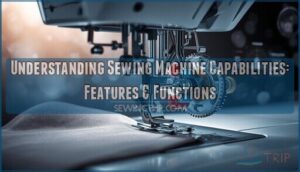This site is supported by our readers. We may earn a commission, at no cost to you, if you purchase through links.
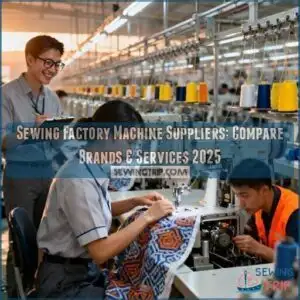 Your factory floor isn’t humming—it’s hemorrhaging money. Every minute your sewing machines sit idle or churn out crooked seams costs you orders, reputation, and sleep. The gap between manufacturers who thrive and those who barely survive often boils down to one decision: choosing sewing factory machine suppliers who deliver more than just equipment.
Your factory floor isn’t humming—it’s hemorrhaging money. Every minute your sewing machines sit idle or churn out crooked seams costs you orders, reputation, and sleep. The gap between manufacturers who thrive and those who barely survive often boils down to one decision: choosing sewing factory machine suppliers who deliver more than just equipment.
You need partners who understand that a $15,000 machine means nothing without same-day service when tension springs snap at 2 AM, or training that turns novice operators into precision craftspeople.
The right supplier transforms your production line from a liability into a competitive weapon—but only if you know which features, services, and brand reputations actually move the needle on your bottom line.
Table Of Contents
Key Takeaways
- Choosing the right supplier means prioritizing post-sale support—same-day repairs, operator training, and predictive maintenance matter as much as the machine itself, turning equipment into a competitive advantage rather than a liability.
- AI-driven automation and sensor-based technologies are reshaping industrial sewing in 2025, cutting defects by up to 40%, eliminating foot pedals for ergonomic gains, and enabling real-time remote monitoring through IoT connectivity.
- China dominates global production with 63% market share (5.9 million units annually), while the industrial sewing machine market is projected to grow from $6.9 billion in 2024 to $11.2 billion by 2035 at a 4.5% CAGR.
- Local distributors offer same-day on-site service and hands-on training, while national suppliers provide volume discounts and broader brand selection—your choice should align with whether speed or scale matters more to your operation.
Top Industrial Sewing Machine Brands Compared
When you’re ready to invest in industrial sewing equipment, you need to know which brands deliver the performance your operation demands. The big names—JUKI, Brother, and BERNINA—each bring different strengths to the table, but they’re not your only options.
Let’s compare what sets these manufacturers apart and where specialized brands like Baby Lock and Janome fit into your decision.
JUKI Vs. Brother Vs. BERNINA
When you’re ready to scale up production or build a commercial sewing operation, three names rise to the top of the industry leaderboard: JUKI, Brother, and BERNINA.
JUKI dominates industrial sewing machine manufacturing with peerless sewing speed and durability test results. Brother delivers solid stitch quality at competitive price points, building strong brand loyalty among mid-sized operations.
BERNINA brings Swiss precision to the machine comparison, excelling in specialized applications where craftsmanship matters most.
Baby Lock, Janome, and Bernette Features
Beyond the big three, Baby Lock, Janome, and Bernette machines pack features that deserve serious attention from factory operators looking to expand their floor lineup.
Each brand brings distinct advantages to your sewing machine comparison:
- Baby Lock – Improved thread tension control and automatic cutters reduce operator training time
- Janome – Superior stitch quality across diverse fabric compatibility ranges
- Bernette – Budget-friendly industrial sewing machines without compromising core performance
- Baby Lock & Janome – Sophisticated sensor systems that adapt to fabric thickness changes
- All Three – Sturdy construction that supports high-volume production schedules consistently
These sewing machines deliver reliability when your operation requires adaptability beyond single-purpose equipment.
Market Influence of Leading Manufacturers
JUKI, Brother, and BERNINA command the global industrial sewing machines landscape with decisive market share advantages. JUKI leads innovation impact through AI-driven features and distribution networks spanning 170+ countries, while Brother balances brand reputation with affordability across sewing machine manufacturing sectors. BERNINA cultivates customer loyalty through premium craftsmanship.
Custom manufacturers like SewPro USA challenge established sewing machine distribution models by delivering custom solutions that reshape buying patterns in niche markets.
The apparel segment’s growth is bolstered by rising fashion consciousness.
Specialized Machines for Quilting and Embroidery
Longarm quilting machines and specialized embroidery units bring industrial-grade precision to creative applications, transforming how studios and production facilities manage intricate textile work. These industrial sewing machines excel when matched with the right components:
- Longarm machines paired with quilting frames deliver wall-to-wall coverage for large-scale projects
- Embroidery software unlocks custom designs across multiple industrial fabric applications
- Thread types and needle selection determine stitch integrity on delicate versus heavy materials
- Quilting machines with embroidery machine capabilities merge artistry with production efficiency
Choosing The Right Sewing Factory Machine Supplier
Finding the right supplier isn’t just about the machine—it’s about the partnership behind it. You need to weigh location, customization, must-have features, and the support that keeps your operation running smoothly.
Here’s what separates a great supplier from one that’ll leave you stuck when you need help most.
Local Vs. National Distributors
When you’re shopping for industrial sewing machines, one of the first forks in the road you’ll hit is whether to work with a local shop down the street or a national distributor with warehouses across the country. Each path offers distinct advantages depending on your commercial applications and how quickly you need support.
| Factor | Local Distributors | National Distributors |
|---|---|---|
| Support Availability | Same-day on-site service | Phone/remote support primarily |
| Delivery Speed | Immediate pickup possible | 2-7 days shipping |
| Brand Variety | Limited to 2-4 manufacturers | Extensive catalog options |
| Pricing Comparisons | Higher per-unit costs | Volume discounts available |
| Customization Options | Hands-on consultation | Online configuration tools |
Local shops like Aurora Sewing Center excel at building relationships—you’ll get individual training and quick fixes when your industrial sewing machines go down mid-project.
National suppliers counter with competitive pricing comparisons and broader sewing equipment selections, making them ideal for scaling operations across multiple locations.
Evaluating Custom-Built Vs. Standard Machines
Choosing between a standard machine off the shelf and a custom-built powerhouse isn’t just about budget—it’s about matching your equipment to the exact rhythm of your production line.
Standard industrial sewing machines ship fast with predictable lead times, while custom sewing machine solutions from specialists like SewPro USA—custom-built per order—deliver heavy-duty sewing machines engineered for your fabric weights and stitch patterns, though you’ll wait longer and face higher maintenance impact from specialized parts.
Key Features for Commercial Applications
The right stitch type, speed control, and durability features separate a machine that barely survives your floor from one that dominates it for years. Look for variable speed control that lets operators dial precision or power on demand, automatic thread cutters that slash cycle time, and heavy-duty frames built to manage thick upholstery or delicate knits without flinching.
Strong material management and automation options protect your investment, cutting machine repair bills while boosting efficiency across commercial applications.
Supplier Support and Training Services
Your supplier’s post-sale commitment matters as much as the machine itself—expert training, responsive repair networks, and hands-on classes transform a steel frame into a revenue engine you actually know how to run.
Strong customer service delivers operator training, technical assistance, and troubleshooting guides that keep industrial sewing machines humming through machine setup challenges, software updates, and customization support for demanding industrial applications—turning downtime into uptime and confusion into confidence.
Latest Innovations in Industrial Sewing Machines
Industrial sewing machines aren’t standing still—they’re getting smarter, faster, and easier to run. From AI that thinks for itself to sensors that replace foot pedals, these advances are changing what’s possible on the factory floor.
Here’s what’s leading the charge in 2025.
AI-Driven and Computerized Machine Advances
AI is reshaping factory floors—over 100 manufacturers piloted AI-powered sewing units by mid-2024, slashing stitching defects by up to 40%. These computerized sewing machines and programmable sewing machines leverage servo motors and robotic sewing tech for millimeter-precise stitching.
Predictive maintenance cuts downtime, while automatic sewing machines take on repetitive tasks, driving labor shifts toward quality control.
Customization impacts are huge: electronic sewing machines now enable on-demand, custom-fit production, reducing waste and meeting individual demand. These advancements are part of intelligent manufacturing ecosystems being adopted by leading firms.
Pedal-Less and Sensor-Based Technologies
Forget the foot pedal—sensor-based machines let your hands do all the talking, freeing operators to focus on precision instead of juggling controls. These automatic sewing machines with servo motors deliver serious ergonomic benefits and slash operator workload:
- Precision control through hand gestures or proximity sensors
- Efficiency gains by eliminating foot-pedal coordination
- Efficient workflow that reduces fatigue in high-volume production
The automation impact on industrial sewing machines is real—you’re looking at faster throughput with fewer errors.
Connectivity: Touchscreens, Wi-Fi, and IoT Integration
Modern touchscreen interfaces and Wi-Fi connectivity transform industrial machines into smart hubs that monitor performance, push firmware updates, and sync production data in real time—so you can troubleshoot from your phone instead of the factory floor.
Cloud integration allows remote monitoring and data analytics that fuel predictive maintenance, catching issues before they halt production.
These computerized sewing machines with servo motors deliver actionable insights for industrial applications, turning raw numbers into smarter decisions.
Productivity Boosters: Automatic Bobbin Changers
Automatic bobbin changers slash downtime to just six seconds per replacement, keeping your production line humming instead of stalling every time a spool runs dry. Thread capacity and bobbin size no longer dictate your workflow—automation benefits include uninterrupted embroidery runs and lockstitch sequences that boost efficiency gains.
These automatic sewing machines deliver downtime reduction that transforms industrial applications, letting you focus on quality instead of constant reel swaps.
Essential Services Offered by Sewing Machine Suppliers
Buying the machine is just the start—what happens after matters just as much. The right supplier backs you up with services that keep your operation running smoothly and help your team get the most out of every stitch.
Let’s look at what separates great suppliers from the rest.
Machine Maintenance and Repair Solutions
When your industrial sewing machine stops mid-stitch or starts skipping threads, you need a supplier who doesn’t just sell equipment—they fix it fast and keep you running.
Look for providers offering on-site repair services, diagnostic tools, and quick access to spare parts. Preventative maintenance plans catch problems early, while repair training and remote support minimize downtime when issues arise.
Training, Classes, and Community Engagement
A supplier who teaches you how to master your equipment saves you more money than one who just sells it and walks away. Look for providers offering sewing classes and workshops, virtual learning options, and in-store events that build real skill development and networking opportunities.
What strong training programs deliver:
- Hands-on industrial sewing machine operation covering stitch types, tension, and troubleshooting
- Specialized workshops for embroidery, serging, and higher-level techniques
- Sewing community events that spark creative inspiration and peer connections
- Virtual learning platforms for remote teams and flexible schedules
- Ongoing sewing education that keeps you ahead of technology shifts and best practices
Accessory, Notion, and Fabric Availability
Every machine needs the right threads, needles, and specialty materials to perform at its peak—and a supplier with deep inventory keeps your production line moving without frustrating delays. You want thread compatibility across weights and fibers, needle selection for specialized fabrics, stabilizer variety for embroidery precision, and pattern availability that fuels innovation.
Top suppliers stock industrial fabrics, marine fabrics, accessories, parts, and supplies—so you’re never waiting on tomorrow’s shipment to finish today’s order.
Rental and Upgrade Options for Businesses
You’re scaling fast, but dropping tens of thousands on new machines isn’t always feasible—so rental programs and upgrade pathways give you flexible entry points and future-proof expansion without the crushing upfront capital.
Trial periods let you test industrial sewing machines before committing, while lease agreements and financing options spread costs across quarters.
Smart suppliers offer upgrade programs tied to ROI analysis—so when you outgrow a lockstitch, you’re trading up, not starting over.
Market Trends Impacting Supplier Selection
The sewing machine market isn’t static—it’s shifting fast, and those shifts should guide your supplier choices.
Understanding where growth is happening, who’s producing what, and which manufacturers are financially solid gives you a real edge.
Let’s look at the trends that matter most when you’re comparing suppliers in 2025.
Global and Regional Market Growth Analysis
The industrial sewing machines market is climbing like a well-oiled production line—global market CAGR projections show a 4.5% growth rate, pushing the industry from $6.9 billion in 2024 to $11.2 billion by 2035.
Regional sales volume tells you where the action is: Asia-Pacific dominates with over 71% market share, while production unit growth centers in China, cranking out 5.9 million units annually.
Key economic factors like automation demand and textile industry expansion drive supplier market share battles among top manufacturers in sewing machine manufacturing and distribution for commercial applications.
Leading Production Countries and Volumes
China’s production engine runs at full throttle—5.9 million industrial sewing machines roll off Chinese manufacturing lines annually, capturing 63% of global output and positioning China as your primary sourcing hub.
India’s consumption trends show 1.8 million units absorbed domestically, while Japan’s precision-focused makers contribute 313,000 units.
Vietnam’s distribution network exports 456 million machines, cementing its role in textile industry supply chains serving industrial equipment buyers worldwide.
Financial Performance of Top Manufacturers
Juki’s revenue growth hit JPY 95.19 billion in 2024, while Brother’s industrial segment saw 27.6% quarterly sales gains. Your profitability trends reveal Juki cut losses by 54%, and Brother forecasts a 10.8% profit ratio.
Regional influence shows Asia driving demand—Brother’s Asia revenue surged 67.8%.
Efficiency metrics matter: Juki’s gross margin climbed to 27%, signaling stronger commercial applications.
Market share stays concentrated among top manufacturers powering industrial equipment distribution globally.
Consumer Decision Factors and Search Rankings
Online visibility shapes your supplier selection more than you might expect. Search engine rankings drive 92% of procurement managers to online directories first, making certified suppliers with optimized listings 2.5 times more likely to earn your inquiry.
Decision-making hinges on three critical factors:
- Certification impact: ISO 9001 and CE credentials become non-negotiable in 100% of export agreements
- Support agreements: 89% of buyers demand written warranties covering training and maintenance before signing
- Spare parts availability: 80% prefer suppliers stocking components for 5+ years, with proactive reminders for scheduled upkeep
Search result ranking isn’t luck—it’s business information evaluation at work.
Frequently Asked Questions (FAQs)
Where can I find the best industrial sewing machines for sale?
Your best bet starts with specialized distributors who offer industrial sewing machine sales and direct imports. Check online marketplaces for new heavyduty sewing machines, auction sites for used machines, and explore leasing options if upfront costs are steep.
Don’t overlook sewing machine parts and accessories availability—that’ll matter down the road.
What is an industrial sewing machine?
Heavy-duty sewing machines built for factories process thick materials, run faster, and outlast home models.
They’re engineered for high-performance industrial applications—think upholstery, automotive work, and garment production at scale, where automation benefits and durability factors matter most.
Where are sewing machines made?
Consider this: your sewing machine’s birthplace shapes its DNA. China’s dominance is undeniable—producing 63% of global units annually, it’s the heavyweight champion of industrial sewing machine applications.
Manufacturers like Juki and Brother emerged from Japan, while BERNINA calls Switzerland home. These brand origins matter because production costs and export markets influence what distributors and service companies offer for commercial sewing machine applications.
Regional manufacturing hubs determine your machine’s quality blueprint.
Where are June sewing machines made?
June sewing machines aren’t widely documented in mainstream industrial manufacturing locations or brand history databases. This emerging custom manufacturer focuses on high-performance industrial machines with limited regional sales data.
Production volume and sewing machine distribution details remain unclear, making June origins harder to verify than established brands.
What services does city sewing machine offer?
City sewing machine shops generally provide Machine Repair, Sewing Machine Maintenance, and Service Repair alongside Sewing Machine Sales.
You’ll find Technical Support, Consultation Services, Part Sourcing, and On-site Repairs—plus Machine Customization for specialized needs.
What financing options do suppliers typically offer?
You’ll usually find lease options, loan programs, and flexible payment plans through sewing machine sales distributors. Many offer trade-ins on older equipment, while some connect you with government grants for manufacturing upgrades.
Service repair teams often bundle financing with sewing machine distribution and maintenance contracts.
How long does custom machine delivery take?
Custom-built machines from manufacturers like SewPro USA generally require four to eight weeks for production timeline completion. Order customization complexity, supplier communication efficiency, and shipping delays can extend installation time.
Working with a responsive custom manufacturer or distributor makes certain you’ll receive realistic delivery expectations upfront.
Are trade-in programs available for old machines?
You won’t be crying over spilled milk when you discover trade-in programs are available through select sewing machine distributors.
Major brands like Baby Lock and BERNINA often participate in trade-in programs, letting you upgrade your sewing machines while offsetting costs with trade-in values based on machine eligibility and condition, though program limitations and recycling options vary by supplier.
What warranty coverage should businesses expect?
You’ll find most industrial machines come with a one- to five-year warranty covering parts and limited labor. Exclusions apply to consumables and misuse.
Extended options and service repair plans help maintain uptime, while reputable suppliers offer machine maintenance and sewing machine repair services beyond standard coverage.
Do suppliers provide on-site installation services?
Why settle for guesswork when planning your production floor? Many sewing machine distribution companies offer on-site installation services, with technician availability and setup time varying by supplier.
Post-install support and customization options guarantee your high-performance industrial machines run smoothly.
Machine maintenance and sewing machine repair services complete the package.
Conclusion
Sure, your factory could keep limping along with suppliers who vanish the moment a lockstitch mechanism jams—because nothing says "competitive advantage" like praying to machinery gods at 3 AM while orders pile up.
Or you could demand what actually matters: sewing factory machine suppliers who treat downtime like the profit-killer it is, offering instant support, rigorous training, and tech that evolves with your ambitions.
The brands and services you choose don’t just fill your floor—they define whether you’re leading your market or watching rivals sprint past.
- https://www.expertmarketresearch.com/reports/industrial-sewing-machines-market
- https://www.alliedmarketresearch.com/sewing-machine-market-A11452
- https://www.thomasnet.com/articles/top-suppliers/cut-and-sew-manufacturers-and-companies/
- https://www.investing.com/equities/jack-sewing-machine-co-ltd-financial-summary
- https://www.juki.co.jp/en/ir/finance/

